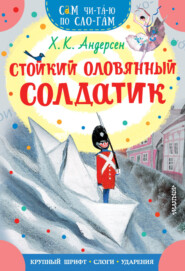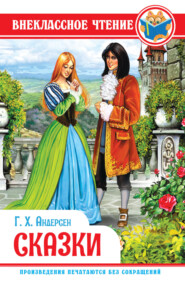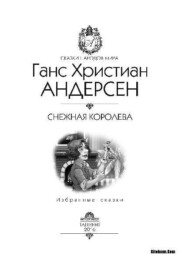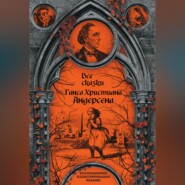По всем вопросам обращайтесь на: info@litportal.ru
(©) 2003-2024.
✖
O. T., A Danish Romance
Настройки чтения
Размер шрифта
Высота строк
Поля
It was not yet three o’clock when the friends reached Ringsted.
“I have never before been so far in Zealand,” said Otto.
“Shall I be your guide?” returned Wilhelm. “Ringsted has a street and an inn, and one is very badly served there, as you will soon both see and experience yourself. Meanwhile, one can think of Hagbarth and Signe; not far from here, at Sigersted, he hung his mantle on the oak, and Signelil’s abode stood in flames. Now only remain fields and meadows, a cairn, and the old popular song. Then we rush past the friendly Soroe, that mirrors itself with the wood in the lake, which forms itself into so many bays; but we do not see much of it. We have here another romantic spot, an old castle converted into a church, high up on the hill near the lake, and close to it the dismal place of execution. We then reach Slagelse, an animated little town; with the Antvorskov convent, the poet Frankenau’s grave, and a Latin school, celebrated on account of its poets. It was there Baggesen and Ingemann learned their Latin. When I once questioned the hostess regarding the lions of the town, she would only acknowledge two,—Bastholm’s library, and the English fire-engine. The curtain in the theatre represents an alley with a fountain, the jets of which are painted as if spouting out of the prompter’s box; or is this, perhaps, the English fire-engine? I know not. The scene-decoration for towns represents the market-place of Slagelse itself, so that the pieces thus acquire a home-feeling. This is the modern history of the little town; and, with regard to its older and romantic history, learn that the holy Anders was preacher here! Yes, indeed, that was a man! He has been also sung of by our first poets. We end with Korsöer, where Baggesen was born and Birckner lies buried. In the more modern history of this town, King Solomon and Jörgen the hatter play a considerable rôle. Besides this, I know that the town is said once to have possessed a private theatre; but this soon was done for, and the decorations were sold; a miller bought them, and patched his windmill sails with them. Upon one sail was a piece of a wood, upon another a shred of a room, or a street; and so they rushed round one after the other. Perhaps this is mere slander, for I have my information from Slagelse; and neighboring towns never speak well of each other.”
In this manner Wilhelm gossiped on, and the friends travelled over the way he had described. Slagelse, and the peasant village of Landsgrav, they had already behind them, when Wilhelm ordered the coachman to diverge from the high-road toward the right.
“Where will you take us to?” asked Otto.
“I will give you a pleasure!” returned Wilhelm. “We shall reach the weariful Korsöer early enough: the steamboat leaves at ten, and it is not yet seven. You shall be surprised—I know well that you are half a Catholic; I will conduct you where you may believe yourself carried back several centuries, and may imagine yourself in a Catholic country. That is right pleasant, is it not?”
Otto smiled. The friends alighted from the coach and walked over a corn-field. They found themselves upon a hill, the whole landscape spread itself out before them—they saw the Belt, with Sprogöe and Funen. The surrounding country was certainly flat, but the variety of greens, the near meadow, the dark stretch of wood in the neighborhood of Korsöer, the bay itself, and all this seen in a warm morning light, produced effect. The friends diverged to the right; and before them, upon a hill, stood a large wooden cross, with the figure of the Crucified One. Above the cross was built a small roof to carry off the rain,—such as one may yet find in Bavaria. The figure of the Redeemer was of wood, painted with strong, tawdry colors; a withered garland of corn-flowers still hung around his bowed head.
“It is extraordinary,” said Otto, “to find in our time, in the year 1830, such a Catholic symbol in Lutheran Denmark! And yet—yes, you will laugh at me, but I find it lovely: it affects me, moves me to worship.”
“That tawdry, tasteless figure!” cried Wilhelm. “Only see how coarse! the hair is covered with tar to keep off the rain! The peasants here have their peculiar superstition. If they allow the cross to fall they have no luck with their lands. It was upon this hill that the holy Anders, the celebrated preacher of Slagelse, awoke. He visited the sepulchre of Christ, but through praying there too long the ship sailed without him, and he was forced to stay behind. Then came a man and took him upon his horse, and they would ride to Joppa: the holy Anders fell asleep; but when he awoke he lay here, and heard the bells ringing in Slagelse. Upon a foal, only one night old, he rode round the extensive city lands, whilst King Waldemar lay in his bath. He could hang his glove upon the beams of the sun. This hill, where he awoke, was called Rest-hill; and the cross, with the figure of the Redeemer erected upon it, which still stands here, reminds us of the legend of the holy Anders.”
A little peasant girl at this moment mounted the hill, but paused when she perceived the strangers.
“Don’t be afraid, my child!” said Wilhelm. “What hast thou there? a garland! shall it hang here upon the cross? Only come, we will help thee.”
“It should hang over our Lord,” said the little one, holding, in an embarrassed manner, the garland of pretty blue cornflowers in her hand. Otto took the garland, and hung it up in place of the faded one.
“That was our morning adventure!” said Wilhelm, and soon they were rolling in the deep sand toward Korsöer, toward the hill where the poet watched the sun and moon sink into the sea, and wished that he had wings that he might catch them.
Melancholy and silent lies the town on the flat coast, the old castle turned into a farm-house—high grass grows upon the walls. In a storm, when the wind blows against the city, the surf beats against the outermost houses. High upon the church stands a telegraph; the black wooden plates resemble mourning-flags hung above the sinking town. Here is nothing for the stranger to see, nothing except a grave—that of the thinker Birckner. The friends drove to the public-house on the strand. No human being met them in the street except a boy, who rung a hand-bell.
“That calls to church,” said Wilhelm. “Because there are no bells in the tower, they have here such a wandering bell-ringer as this. Holla! there lies the inn!”
“Baron Wilhelm!” cried a strong voice, and a man in a green jacket with pockets in the breast, the mighty riding-boots splashed above the tops, and with whip in hand, approached them, pulled his horse-hair cap, and extended his hand to Wilhelm.
“The Kammerjunker from Funen!” said Wilhelm; “my mother’s neighbor, one of the most industrious and rich noblemen in all Funen.”
“You will come one of the first days to me!” said the Kammerjunker; “you shall try my Russian steam-bath: I have erected one upon my estate. All who visit me, ladies and gentlemen without any exception, must try it!”
“And do the cherry-trees bear well this year?” asked Wilhelm.
“No, no,” answered the Kammerjunker, “they are good for nothing; but the apples are good! All the old trees in the hill-garden stand in full splendor: I’ve brought them into condition! Two years ago there was not, on all the trees together, a bushel of fruit. But I had all the horses which had to be bled led under the trees, and had the warm blood sprinkled upon the roots; this happened several times, and it has been a real inoculation for life.”
“The wind is certainly favorable,” said Otto, whom this conversation began to weary.
“No, just the contrary!” said the Kammerjunker. “The vane upon the little house yonder lies; it points always to Nyborg, always shows a good wind for us when we want to leave. In Nyborg is also a vane, which stands even as firmly as this, and prates to the folk there of good wind. I regard both vanes as a kind of guide-post, which merely says, There goes the way! No, if we had had a wind I should have gone with the boat, and not with the little splashing thing, as the seamen call the steamboat. The carriage is doubtless awaiting the young gentleman in Nyborg?” pursued he. “I will join company with you—my brown horse waits for me at Schalburg. You should see him! He has sinews like steel springs, and legs like a dancing-master! He is my own brown.”
“No one knows that we are coming,” answered Wilhelm. “We shall, therefore, take a carriage from Nyborg.”
“We will join company,” said the Kammerjunker, “and then you will pay me a visit with the young gentleman. You shall sleep in the black chamber! Yes, you will give me the pleasure?” said he to Otto. “If you are a lover of the antique, my estate will afford you pleasure; you find there moats, towers, guard-rooms, ghosts, and hobgoblins, such as belong to an old estate. The black chamber! after all, it is not quite secure there; is it, Herr Baron?”
“No, the deuce remain a night with you!” said Wilhelm; “one gets to bed late, and even then it is not permitted one to close one’s eyes. You, your sister, and the Mamsell,—yes, you are a pretty clover-leaf! Yes, Thostrup, you cannot believe what pranks are hatched upon the Kammerjunker’s estate! One must be prepared for it! It is said to be haunted, but if the dead will not take that trouble the living do. The Kammerjunker is in the plot with his women-folk. They sewed me lately live cockchafers into my pillow, and they crawled and scrambled about till I did not know what the deuce it could be! A live cock they had also placed under my bed, and just in the morning, when I would go to sleep, the creature began to crow!”
“The women-folk had done that,” said the Kammerjunker. “Did they not the very same night fasten a door-bell to the head of my bed? I never thought of it; fat Laender slept in the same room, and had fastened along the wall a string to the bell. I awoke with the ringing. ‘What the devil is that bell?’ said I, and glanced about the room, for I could not conceive what it was. ‘Bell?’ asked Laender—‘there is no bell here!’ The ringing also ceased. I thought I must have dreamed, or that our merry evening must have left some buzzing in my ears. Again it began to ring. Laender looked so innocent all the time, I could not comprehend myself; I thought it must be my imagination. I became quite fainthearted, I denied my own hearing, and said, ‘No, I have only dreamed!’ and commenced reckoning and counting to employ my mind; but that did no good, and it nearly drove me mad! I sprang out of bed, and then I found out the trick: but how Laender grinned! he was swollen and red in the face with his mirth.”
“Do you play such jokes on your estate?” inquired Otto, addressing himself to Wilhelm.
“No, not such refined ones!” returned the Kammerjunker; “perhaps a piece of wood, or a silly mask, is laid in your bed. Miss Sophie gives us other clever things for amusement—tableaux and the magic-lantern. I was once of the party. Yes, what was it I represented? Ah, I played, Heaven help me! King Cyrus: had a paper crown on my head, and Miss Sophie’s cloak about me, the wrong side turned outward, for it is lined with sable. I looked like Satan!”
The steamboat passengers were summoned on board, the company went down to the vessel, and soon it was cutting through the waves of the Belt.
CHAPTER VIII
“See now, Fünen signifieth fine,
And much in that word lies;
For Fünen is the garden fine,
Where Denmark glads its eyes.”
The nakedness which the last aspect of Zealand presents occasions one to be doubly struck by the affluent abundance and luxuriance with which Funen steps forth. Green woods, rich corn-fields, and, wherever the eye rests, noblemen’s seats and churches. Nyborg itself appears a lively capital in comparison with the still melancholy Korsöer. One now perceives people upon the great bridge of boats, on the ramparts, and in the broad streets with their high houses; one sees soldiers, hears music, and, what is especially animating upon a journey, one comes to an excellent inn. The drive out through the arched gateway is an astonishment; it is the same length and breadth as one of the gates of Copenhagen. Villages and peasants’ houses here assume a more well-to-do aspect than in Zealand, where one often on the way-side imagines one sees a manure-heap heaped upon four poles, which upon nearer examination one finds is the abode of a family. On the highroads in Funen one perceives only clean houses; the window-frames are painted; before the doors are little flower-gardens, and wherever flowers are grown, as Bulwer strikingly remarks, the peasant is in a higher state of civilization; he thinks of the beautiful. In the ditches along the highway one sees lilac with their white and lilac flowers. Nature herself has here adorned the country with a multitude of wild poppies, which for splendor of color might vie with the most admired and beautiful in a botanic garden. Especially in the neighborhood of Nyborg do they grow in exceeding abundance.
“What a dazzling color!” exclaimed Otto, as the friends rolled past these beautiful red flowers.
“That is a proud color!” said the Kammerjunker, who rode near them upon his brown steed, “a proud color! but they are manured with the blood of Andalusian horses. It was just here where the battle between these beasts took place. You know that sit the year 1808 the Spaniards lay in Funen; the English ships were cruising about in the Belt, and Romana fled with his whole army on board, but they could net take their horses with them. These were the most splendid Andalusian creatures that eyes ever saw. The Spaniards took off their bridles, and left them here to scamper about the fields like wild horses. The horses of Nyborg chanced also to graze here, and as soon as the Andalusian steeds became aware of ours they arranged themselves in a row, and fell upon the Danish horses: that was a combat! At length they fell upon each other, and fought until they fell bleeding to earth. Whilst still a boy I saw little skull of one of these beasts. This is the last adventure left us from the visit of the Spaniards to Denmark. In the village through which we shall now pass are some outer remembrances. Remark the young lads and lasses,—they are of a darker complexion than the inhabitants of other Funen valleys; that is Spanish blood, it is said. It was in this village that the story took its rise of the preacher’s servant-girl, who wept and was so inconsolable at the departure of the Spaniards. But not on account of her bridegroom did she weep,—not over her own condition. The preacher consoled her, and then she said she only wept to think that if the innocent child resembled its father it certainly would speak Spanish, and then not a soul would understand it! Yes, such histories as this have we in Funen!” said he laughingly to Otto.
With similar relations, and some agricultural observations, according as they were called forth by surrounding objects, did our excellent landed proprietor amuse our young gentlemen. They were already distant several miles from Nyborg, when he suddenly broke off in the midst of a very interesting discourse upon a characteristic of a true inhabitant of Funen, which is, that whenever he passes a field of buckwheat he moves his mouth as if chewing, and made Wilhelm observe a Viennese carriage, which approached them by a neighboring road. To judge from the coachman and the horses, it must be the family from the hall.
This was the case—they returned from paying a visit. Where the roads crossed they met each other. Otto immediately recognized Miss Sophie, and near to her sat an elderly lady, with a gentle, good-humored countenance; this was the mother. Now there was surprise and joy. Sophie blushed—this blush could not have reference to the brother; was it then the Kammerjunker? No: that appeared impossible! therefore, it must concern Otto. The mother extended her hand to him with a welcome, whilst at the same time she invited the Kammerjunker to spend the afternoon with them. There lay, in the manner with which she proposed this, so much attention and consideration, that Otto felt the man was here held in greater esteem, and was otherwise regarded than he, during their short acquaintance, had imagined possible.
Sophie added, smiling, “You must stay!” To which the Kammerjunker replied with an apology for his travelling-dress.
“We are not strangers!” said the mother; “it is only a family meal! You see the usual circle. You, Mr. Thostrup,” added she, with a most obliging manner, “I know so well from Wilhelm’s letters, that we are no strangers. The gentlemen are acquainted with each other!”
“I accept the invitation,” said the Kammerjunker, “and I will now show you into what a gallop I can put my steed! It is Carl Rise,[2 - Translator’s Note: Name of one of the heroes in Waldemar the Conqueror, a romance by Ingemann.] as you see, young lady—you called him so yourself!”
“Yes, ride forward,” said Sophie, smiling. “By that means you will oblige my sister. She might otherwise be quite frightened, did she see such a mighty caravan approach the house, did she had not properly prepared the dinner-table.”
“As my gracious young lady commands!” said the rider, and sprang forward.
The country became more woody; the road passed various small lakes, almost overgrown with water-lilies and shaded by old trees; the old-fashioned, indented gable-ends of the hall now peeped forth. They drove through an avenue of wild chestnut-trees; the stone pavement here threatened to smash the carriage axles. On the right lay the forge, through the open door of which flew the sparks. A little girl, with bare feet, opened a gate, and they now found themselves in a large open space before the red-painted out-buildings. The ground was covered with straw, and all the cows of the farm were collected here for milking. Here they were obliged to drive, step by step, until by the gateway they reached the larger courtyard, which was inclosed by the barns and the principal building itself. This was surrounded by broad ditches, almost grown over with reeds. Over a solid bridge, resting upon pillars of masonry, and through a principal wing which bore the armorial bearings and initials of the old possessor, they arrived in the innermost court, which was shut in by three wings, the antique one already mentioned, and two others: the fourth side was inclosed by a low trellis-work which adjoined the garden, where the canals lost themselves in a small lake.
“That is an interesting old court!” exclaimed Otto.
“O, that is not to be compared with the Kammerjunker’s!” returned Wilhelm: “you should first see his!”
“Yes, you must come over some of these days,” said the Kammerjunker. “Silence, Fingal! Silence, Valdine!” cried he to the barking dogs. A couple of turkey-cocks spread their feathers out, and gobbled with all their might. Men and women servants stood at the door: that was their reception!
“Thostrup will have the red room, will he not?” said Wilhelm, and the friends ascended the stairs together.
A pale young girl, not free from freckles, but with eyes full of soul, hastened toward them; this was Wilhelm’s youngest sister. She pressed her brother to her breast, and took Otto’s hand with kindness. She is not beautiful! was the first impression she made upon him. His chamber was vaulted, and the walls painted in the style of Gobelin tapestry; they represented the whole of Olympus. On the left was an old fire-place, with decorations and a gilt inscription; on the right stood an antiquated canopy-bed, with red damask hangings. The view was confined to the moat and the interior court. But a few minutes and Otto and Wilhelm were summoned to table. A long gallery through two wings of the hall, on one side windows, on the other entrances to the rooms, led to the dining-room. The whole long passage was a picture-gallery. Portraits the size of life, representing noble knights and ladies shining forth in red powdered periwigs, children adorned like their elders, with tulips in their hands, and great hounds by their sides, together with some historical pieces, decorated the walls.
“Have we no garland on the table?” asked Sophie, as she entered the dining-room with the others.

















